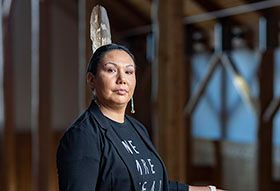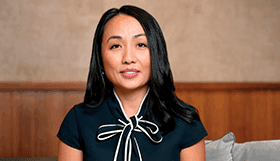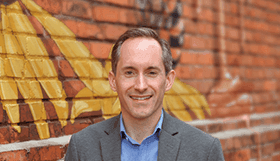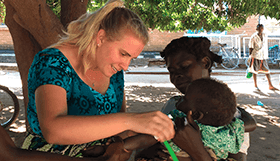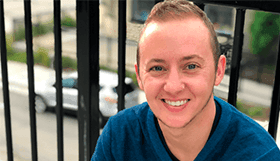UW Major: Physics
Age: 39 | Okinawa, Japan
Depot Avionics Section Chief, United States Air Force
From a duty post in Okinawa, Japan, MSgt. Kristian Johnsen sees to it that U.S. Air Force aircraft are mission ready.
Johnsen is an expert technician in avionics, the computer and circuitry systems aboard aircraft that allow pilots to communicate, navigate, deploy weapons, and importantly, stay aloft.
A self-described “math nerd,” Johnsen is proud to use his UW education in electronic theory and critical thinking to perform the most challenging diagnostics and repairs of F-15 and F-16 aircraft.
“I like the electronics aspect of it — also being so directly tied to the mission,” Johnsen says. “For me, the Air Force was always a lifelong dream.”
Outside the avionics shop, Johnsen has been active in Honor Guard teams and has earned numerous Air Force medals of commendation and achievement. He’s also a respected advocate for lesbian, gay, bisexual, and transgender (LGBT) service members around the globe.
“It can be really challenging when you’re a service member, and you’re already stationed overseas, you’re away from your family, you’re at a new duty station,” Johnsen says. “And now you’re also dealing with challenges of identifying as LGBT, especially for brand-new airmen. They’re learning to do their job; they’re trying to fit in.”
After Johnsen came out as transgender to his squadron, he committed to sharing what he learned during his own transition to benefit other service members. He’s since been contacted by other transgender airmen, as well as officers from across the Air Force, who ask Johnsen about how they can support transgender airmen in their ranks.
While at UW–Madison, Johnsen helped students navigate a similar path. He served as a student director of the LGBT Campus Center (now part of the Office of the Dean of Students), a leadership experience that continues to inspire his activism.
“I’ve been able to take from Wisconsin my LGBT activism and education and spread it through the Air Force,” he says. “When you finally find these other individuals who identify as you do, it’s so essential to continuing to be the best airman that you can be.”
From air bases in the Great Plains to the islands of Japan, Johnsen has raised awareness about the challenges that LGBT service members and their families face. When he shadowed basic-training instructors, he had the opportunity to engage with basic-training leadership to help them understand transgender issues. Collaborating with his medical teams, he’s advised clinicians about best practices in providing medical care and mental-health services for transgender airmen.
When stationed in northern Japan, Johnsen chaired the air base’s first-ever Pride Month celebration, designed to bring visibility to the LGBT community. He also organized Pride Month educational programs during a six-month deployment to Qatar, where he earned commendation from the wing commander.
Now in Okinawa, Johnsen engages the LGB and transgender communities by organizing networks and activities. In 2018, he helped raise more than $7,000 through five Pride Month events, including the base’s first joint-service Pride triathlon. As part of a collaborative support group for active-duty service members across Okinawa, he was also invited to serve as a mentor for transgender Marines and sailors who were dealing with challenges from their command.
Johnsen is a decorated first sergeant and senior enlisted leader, entrusted to oversee the morale and well-being of his squadron. He says a more inclusive military culture, where LGBT service members can find the acceptance and community they need for personal wellness, career success, and pride in their service, brings benefits to all.
“When you realize that there are other people out there who wear the same uniform as you do, who support you in all that you are, it just really helps morale,” Johnsen says. “It helps you build the teamwork that you need, because nothing gets done in the military without teamwork.”

